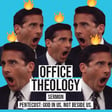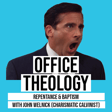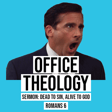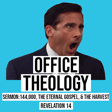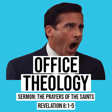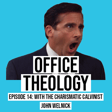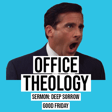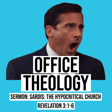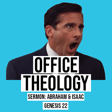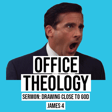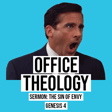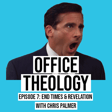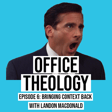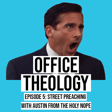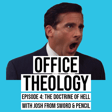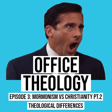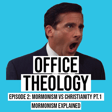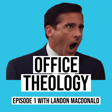Become a Creator today!Start creating today - Share your story with the world!
Start for free
00:00:00
00:00:01

Ep. 18 - The pitfalls of reading an Eastern text with a Western Mindset with Marty Solomon
Marty Solomon co-hosts the BEMA podcast, is President of Impact Campus Ministries, and is the author of Asking Better Questions of the Bible.
In this podcast we talk about the common pitfalls of how westerners read the Bible.
Transcript
Introduction and Marty's Background
00:00:00
Speaker
Hey, well, welcome to the Office Theology podcast. We have a special guest, Marty Solomon with the Bayma podcast. Today, we're going to discuss the topic of the pitfalls of reading an Eastern text through a Western mindset. So Marty's a co-host of Bayma podcast and is a president of Impact Campus Ministries. And he authored the book, Asking Better Questions of the Bible. So why don't you share a little bit about who you are and kind of how you got to where you're at. Sure. Um, let's see here. I've been married for 20. This was 20 years this January. Nice. My wife, Rebecca, we have two kids. I've got a 15. I keep wanting to make her younger, but she's getting older every day, but I got a 15 year old daughter and a 14 year old son. We live out here in Ohio and Cincinnati.
00:00:50
Speaker
and moved here in June of 2020. Before that, I'd spent my whole life in Idaho, of all places, like all over the state. Grew up in Southern Idaho my whole life, passed into church in Boise for seven years, went back to my home church for four years, yeah went up north and did campus ministry. And that, I mean, that was all pretty
Journey of Faith and Interpretation
00:01:08
Speaker
much a part of my story. Somewhere in the middle of my early ministry career, I... um I had a bunch of questions like, our I mean, we were using the word deconstruction back then for something else. Like we were talking about post-modernity. But I was going through that kind of a phase, kind of taking my faith apart. I had a bunch of big questions. People handed me some new teachers. I had some great mentors and I got to go study it over in Israel and Turkey.
00:01:37
Speaker
And it just changed everything, like reading the Bible through a new hermeneutic, a historically informed, term and it wasn't fringe, it wasn't crazy. It was just not what I had been handed in my fundamentalist yeah um theological training. I hadn't been given those tools. So I had this new set of tools and a new toolbox and was passionate to give it away. Started working with college students and that work eventually as I took the job of president, I had to travel more and that became a podcast. and Yeah. I've been trying to steward a 200 pound baby ever since. So that's kind of what it is. Have you seen a ah lot of ah growth over the years? Was it like slow and then all of a sudden or kind of how did that FEMA take off? Yeah, it's kind of hard to know because we weren't, ah even today we don't really pay a whole lot of attention to it, but we weren't paying attention for the first three or four years. yeah um We had designed it for our local college students.
00:02:29
Speaker
We knew that other people could use it. We assumed that other people, we knew that some people were listening. yo and yeah yeah And about two years in, we started in August of 2016. I think the end of 2018, we started to realize like, oh, we got a handful of groups around the country. yeah Then we started paying attention. And I think that's where a lot of the growth curve started to come in. Yeah. And that's where everything, so it's been a steady, just a steady slope of people and obviously creating content, writing books, just helps those kinds of things. so Oh yeah, absolutely. Yeah. yeah um Do you feel like ah when you saw the growth and different things happen that way, you felt like a responsibility in a sense, for lack of better words, to formalize discussion groups, because you talk about that often in your podcast, there might be a discussion group near you.
Podcast Growth and Community Formation
00:03:19
Speaker
What was the goal of having discussion groups with your podcast? Yeah. that was ah Again, that was one of those mistakes. like we had people list Somebody else formed a discussion group with no encouragement from anybody. like They just did it. and Then we found out about it. We're like, oh, that's cool. and Then one of our board one of our board members was like, wait, you have people that formed a discussion. like Why are you not keeping track of this. Yeah. And as far as weight, we never felt like that. What we've always wanted to do is create resources and send them out. We don't want to draw people in. So we don't really want to we're really not interested in building a platform. And we're not trying to we just wanted to facilitate the connection. Yeah. So we still we're we're really hands off with all those groups. All we do is have a Google map.
00:04:01
Speaker
yeah connect people to email addresses. That's all we do. And the map is horribly out of date. Like we know that. Um, but if we can facilitate even a few connections to people that can find yeah community and yeah helpful relationships. Most of the time it seems like self starters, like, Hey, I'll get a few, Hey, listen to this. Hey, listen to this. I know we've done it a handful of your episodes in the community groups that I've led over time. Like, Hey, let's listen to this and discuss it as well. Right. That's cool. Yeah. Well, that's awesome. Thank you for sharing a little bit about yourself. yeah um Now the topic at hand, I know it's one that you're you're very passionate about.
Western Lens on Biblical Texts
00:04:35
Speaker
um So our title of this discussion, once again, is the pitfalls of reading an Eastern text through an Western mindset. ah What do you think are the three to five, you can give more, it's kind of up to you, are the three to five pitfalls to reading the text in this way? Yeah, you know, i I had a post way back when my publisher was helping me learn how to do social media. It was a fun world.
00:04:59
Speaker
um But I had a post back then where I went through seven common mistakes when reading the Bible. Yes. um And most of them are going to be connected to this larger idea of just having an awareness of the historical Easternness or just the historical nature of the piece of literature we're reading. So I have like a ah list like, great number one, this was written to me, like this whole common, yeah like the Bible was written to, like the Bible wasn't written to me. I love how people say it wasn't written to us, it was written for us, which is a step in the right direction. I'm not even sure that's horribly accurate, yeah but I do have it, and that's beautiful, and it has been preserved with much faithfulness.
Embracing Doubt and Literary Tension
00:05:39
Speaker
um I have ah have this feels like letting our biblical interpretation be driven by subjectivity, so that's the other side of it. So I grew up in the literalism, but
00:05:49
Speaker
The other side of it is just the, well, it's all up for grabs with no objectivity to it. I think there is the um the I'm not allowed to feel. One of the things that we struggle with when we start reading an Eastern versus a Western book yeah is doubts. I write a lot in my book about, at least at the beginning, like trying to validate doubt doubt as a sign of vibrant faith, not anemic faith. Yeah. Because doubts, I just did an interview earlier this morning with another podcast, oh and she called it a flashlight. ah Doubts are flashlights. I'm like, oh my gosh, I love that. That's great. Yeah. So I do love this idea that that debunking this idea that I'm not allowed to to have any of these feelings, because you're going to, you start to deconstruct some of this stuff, you start to unpack this. Oh yeah. um
00:06:38
Speaker
This affirms everything I already knew to be true. ah Confirmation bias, definitely real, right? Yeah. um So we already come with our Western theologies, and our Western theologies were asking a particular set of questions. Those questions are hardly ever the questions that the Bible was asking. Yeah. What are some of those questions real quick? Do you think the Western... Oh gosh, things like... things like um how does the nature of God, the abstract nature of God and the abstract nature of man and our sinfulness, how does that collide in a legal system of soteriological, you know, we we have this yeah A plus B equals C and so. um Yeah, and I'm sure we'll dive in and and talk about how ah the text was written
00:07:22
Speaker
And it's it's written for you to mine and to dig and and to find. Yeah. Yeah. Can't keep going. The idea of proof texting such a Western concept because they I mean, the Eastern they're not proof text. They didn't have like we can prove text easily because we have chapters and verses in the way we've ordered the text like they just didn't even think about it that way on one hand. On the other hand, it wouldn't have been nearly as easy because much of its oral anyway. Yeah. Yeah. And that's and those were added way later and and not inspired. Totally. Yeah. Totally. Absolutely. um
00:07:53
Speaker
The Bible is completely uniform with no tension at all. is like I remember being trained in apologetics where you were trying to like prove there are no contradictions. It's like the exact opposite impulse of the world of the Bible. like They're trying to address the fact that so much of wisdom says so much of our world exists in tension. yeah um They're using literary tools to purposely provoke and put a problem in so that I'll go digging for a treasure and all that stuff. And so the the pitfall would be if there's no tension and there's nothing to dig for.
00:08:30
Speaker
Is that what you're saying? Absolutely. and wait And every time we find the pi the every time we find the tension, yeah we resolve it and we miss the door. Like there's a door like literally like rattling with light behind it. Like walk through me and we're like, yeah don't look at the door. Don't look at it. We resolve that tension. Yeah. So we never actually find the goodness in there. so That's good. thats So some lists that I came up with a while ago. Yeah, that's good. um Maybe kind of out of those seven, what are the ones that you feel like you see the most? And let's maybe back up one step real quick. When we say reading an Eastern text through a Western mindset, maybe break that that's sentence down for a moment. Yeah, so another way that I would phrase that, let me just see if I rephrase it and maybe it will be perfect helpful. we I think we always try to get the Bible to meet us on our terms.
00:09:23
Speaker
So here's our context, here's our questions, here's our theological conundrums. What does the Bible have to say about that, rather than be rather than meeting the Bible on its terms? So what is the conversation that the Bible was having 2,000 years ago, 2,500 years ago? It's having a conversation in particular context. Let me go meet the Bible on its terms. have that conversation, learn the lesson, then I will extract myself from that exercise, come back to my world and go, why is that lesson from 2000 years ago still unbelievably helpful today? but We keep trying to pull the Bible into
00:10:00
Speaker
um a Western mindset to answer questions the Bible. And I had a buddy that always said, when you ask questions, the Bible isn't asking, you're always going to get the wrong answers. Not because they're not good questions, but because the Bible is not asking that question. So whatever answer you're coming up with is not the answer or the discussion that the Bible was trying to have. Come on, well said, well said. you know Great, that's awesome. So, okay, from that mindset that you said, that description, out of those seven that you've written, what are the top three, and maybe take some time to expound on them, um why do you think those are are prevailing issues? i I think we are always, I'm probably just gonna reword,
00:10:46
Speaker
I'm gonna combine some stuff and reword it. But- Great, I love it. I think
Affirmation vs. Transformation in Faith
00:10:50
Speaker
one of the biggest pitfalls we have is we already know what we believe. And so we use the scripture to prop up a pre-existing belief system. It's theology, Bible, whatever, rather than Bible theology. Um, because whenever I've heard a speaker, you know, you're at a conference or whatever, or somebody sends you a link and you're listening to it. Your brain is not going historical hermeneutics context. What's the Bible? Your brain, most of us as Westerners have been taught to hold it up against a checklist of.
00:11:26
Speaker
is this theologically sound. i'm not I'm not thinking exegetically. I'm really not thinking about what's going on. My knee-jerk reaction, even me, just because of my all my training that I have, is is this does this align with the theological box that my feet are planted in? And so we we are very rarely approaching the Bible with this inquisitive, what What does God want to change about us or me to today? yeah We're almost always reading the Bible. yeah No, we're not. We're using the Bible to defend a system we've already built. yeah um And nott even I mean, that's easy for me to throw stones at. I'm sure I'd do it. Well, what's interesting is um it's it's funny, because you know, and I shared with you, so I'm
00:12:19
Speaker
um a pastor before a meme maker, believe it or not. yeah um But what I've stumbled upon with running a meme account that compares the office to Bible stories yeah is I have this random space of time that I have almost 57 or 60,000 followers that have their attention. yeah And I make posts that, that roast all sorts of belief systems and denominations. And I roast my own beliefs probably more than anybody else is just saying. yep But I'm not doing it to be like a jerk, believe it or not. I'm not just like trying to fight people. I'm really curious
00:13:04
Speaker
Have you been handed your theology or have you thought about your theology? right Honestly, that's what I'm doing. like yeah Maybe I'm over spiritualizing the meme game, but i but I'm yeah just curious by nature because i what i what I'm learning is the people that I get the most offended are the ones that they don't know why they believe what they do. And so their entire life is built on this foundation that they've never put any thought to. So when anybody challenges it, it becomes really Um, don't you dare actually, I'm going to unfollow you because I don't like what this is provoking within me and the, the DMS that come from people. I think the Catholics are the most angry people I've met, but, um, it's just interesting because what you were kind of saying, like people, people love the Bible to a confirmation bias to affirm what they already believe.
00:13:57
Speaker
and to use what they already believe to go against any beliefs that challenge their beliefs. And like, there has to be a better way to have these discussions. There has to be a, I just think the Bible provides a better foundation than that for your life. You know what I'm saying? Absolutely, yep. Yeah. Yeah, 110%. It's like, and in a lot of ways, um the Bible was like the OG meme account. Like it it really was always like taking what was assumed and then going, okay, but hold on a second. hold it this way because there's another side to the story. yeah And throughout all of, and we just kind of see the Bible as this like kind of static biblical library. But when you walk through the historical story, it's like having a conversation with itself. It's making, not corrections, nothing out does, undoes other parts of the Bible. That's not what I'm saying. yeah But there's like, oh, we're we're unfolding, we're evolving, we're learning more. And if we overextend that, or if we don't appreciate the nuance, well, hold on, here's a book coming in to talk to us about the nuance of that.
00:14:56
Speaker
so So now we're in exile, and now the question is, what are we going to do? And now there's all these different voices in conversation. Well, one voice says, well, we should go back home. One voice says, we should stay in Persia. One voice says, both of these are missing the point. And all of these voices are competing at the end of Tanakh, at the end of the Hebrew scriptures. yeah And we typically don't even appreciate that ongoing conversation. Which one of them is right? All of them are. yeah But there's this dynamic, well, hold on, don't just go over there, because that's not the only camp to set up, to set up your tent in like there's, ah there's other places to live and move and see God at work. Yeah. Well said. That's so good. Yeah. And it's, uh, and that's why, um, I think paired with your podcast and then certain reading that I have in like people in my life that are helping disciple and develop me, there's been like a ah deep, not that I've,
00:15:48
Speaker
And I'm trying to say this carefully. I'm not saying that I don't care for the word of God, but my appreciation just over time, just keeps getting deeper and deeper. So it feels like in comparison, like, did I even like the Bible, you know, like 10 years ago, but it's like. the more you reveal and the more you dig and the more you start to understand how the Bible was written and why it was written, who was written to, um, I feel like it just comes, becomes more and more alive. And so when, as a pastor, when I'm talking to people, they're like, ah, the Bible's this, the Bible's that, the Bible's boring, or like, I don't really understand it. Um, I don't know what I'm supposed to do with it for me. And I'm hearing all these words of like, you're
00:16:30
Speaker
you're You're missing it. So if you were in my spot and someone's sharing that with you, kind of like those responses, what would you say?
Evolving Faith and Seeking Truth
00:16:37
Speaker
Yeah, just last night I was doing a live stream Q and&A with a bunch of our listeners and somebody asked almost that exacts that exact question. like great And I can't remember how they worded it, but it was obvious that like, okay, the problem and on some level is that I used to have this understanding of the Bible. Like it used to be this. And now I'm realizing I'm not on board for that anymore. yeah But I haven't figured out where I'm gonna land quite next. And the next part won't be the final spot, because it will be the next spot that will be there for a while until I move again. Like that's just the nature of, and that's another thing by the way, it's kind of a side note, but I love it i don't think we say out loud enough
00:17:17
Speaker
that like healthy, growing, vibrant faith is going to be growing, changing. I don't wanna be the same person who has the same beliefs 10 years from now as I do today. no Like I hope I have different beliefs. And yet the way we posture ourselves with our convictions does not send that message internally or externally. We act like it's this static system of truth that is completely and totally. But what kind of things am I, and where how do I steward this moment now? yeah Like where's the next spot I need to be? And so this person asking this question was like you're kind of in limbo and you haven't yeah figured out
00:17:51
Speaker
but But then like I went on to wax eloquent about just like, golly though, like man, when you get into the Bible and this thing just keeps opening up and opening up. like I haven't found anything like it. like I love Tolkien. Tolkien, what an amazing, but there's there's nothing in Tolkien that quite does with this ancient biblical library. is able to do and I do believe that it has to do with this thing that we call God-breathed, we call inspiration, we call yeah like it's filled the origin, the source of this stuff is something other than just a great author, yeah man's brilliance.
00:18:30
Speaker
yeah um There's something about spirit-filled words, like the sword of the spirit, which is the word of God. There's something about these words that don't return void. yeah like That's why I'll get up every morning, because I'm not just reading anymore to get to mine it for data. like That's the other pitfall I think we do. we yeah We read the Bible just to mine it for truth. like it's got a limit like It's got a finite amount of truth units, and I'm just going to mine that out as much as I can, yeah rather than searching a dynamic quest for meaning. And that's why I'm gonna get up every morning and do everything I can to put the Bible in me. Because that meaning, I mean, I think of Karen Swallow prior. She wrote the book, The Evangelical Imagination. yeah And she says, imagination is where we make meaning. And we can act like that's not what we do in theology, but that's exactly what we do in theology. yeah So how do we make meaning
00:19:25
Speaker
ah That's why I need the Word of God just like in me so that these inspired metaphors, so that this theology that's taking shape in me. yeah yeah that's I don't read it anymore because I have to mine it for truth and get that thing out. and So anyway, those are some of my thoughts. Yeah, that's great. And I think um that mining for truth, ah I've run into this, I think a handful of times, but when people use scripture and their whole intent is to figure out what's true, um so they can be right. ah Do you think that people, once they feel like they have come to the very bottom of the barrel of the truth on a subject, right? um That scripture deals with. Do you think that people stop pursuing scripture because they feel like they figured it out? Have you seen that in your experience?
00:20:19
Speaker
Yeah. Yeah. and And I can't believe how early of I feel like that stopping happens in the journey. Yeah. um But absolutely. We did an episode, one of my favorite episodes on the podcast. I think it was episode 206. It's called The Nature of Truth. It was with my good friend Reed Dent, who later became a co-host on the podcast. but at the And when we did the episode, it was just me and him chatting about... And we just talked about, like, Truth, like what is truth? Usually we think truth is like, truth is what is, like what happened. yeah um But truth is bigger than that. Like tried talking about like, who is who is your wife? Try explaining your wife by like her height and you her her dad color. yeah Just data, like you would never have people look at you like you're an idiot because because you would be because truth is like, you can't quantify that with just data points.
00:21:15
Speaker
that's That's a great, great analogy. Yeah. yeah if I remember reading that, and there was a, I was up i was at the Great Spiritual Migration by Brian McLaren, where he referenced a rabbi that said, one of his rabbi friends that said, Christians read the Bible looking for truth, but Jews read the Bible looking for meaning. That quote has stuck with me ever since I have have read it. break Break that down a little bit. just Just that same idea of we we read the Bible looking for the facts, the what is that is contained in there that I'm supposed to know, who but a Jew will read the Bible going, okay, but what difference does that make? yeah So a great example would be,
00:21:58
Speaker
ah Adam and Eve, we read the story, Westerners read the story, trying to figure out what happened and how sin entered the world. But a Jewish understanding of the of that story is about why we all sin in the first place. It's not about what happened, it's about what happens. um they're They're looking for meaning out of that story, which is why the Jewish jewish theology has no construct of the fall. That's an Augustinian concert. I'm not saying it's right or wrong, but the Jews don't have a concept of the fall where sin entered the world because for them, the story is not about the mechanical happenings of the story. yeah It's about why human nature is that way in the first place. yeah o And that I think even that mirror is exactly what happens when someone they've arrived to the truth of the fall of mankind. yeah stop They stop digging.
00:22:46
Speaker
They stop asking the hard questions of, well, why? Why is it that way? Why are we this way? and and Notice it's abstract yeah and doesn't typically provoke my me, like my transformation, because that's about what happened in how sin entered the world and why my sinful reality is what it... But if I wrestle with why humankind... like Like how this story is about fear and insecurity. Yeah. Well, that's going to provoke me today. That's going to provoke like my relationships today, how I live tomorrow. Like that's going to be an immediate transformative, like go to work inside my heart thing. Yeah. But that's the difference, I think, between truth and meaning. Yeah. And do you think that mining for truth in scripture can be a cop out for transformation with the truth that you find?
00:23:38
Speaker
ah yeah I mean, that's a pretty broad stroke, I'll admit, but. Yeah. yeah i Yes, I think absolutely it can be. My question is, my follow up question will be how how conscious are we of that? Is it subconscious? Is it conscious? is it I don't know, but it certainly can be. I don't know if it if it is as much as I probably act like it is. um yeah and there's There's still good stuff that comes out of mining for truth and hundred western Western thought is not the- This is not an anti-truth conversation. Right. yeah Augustine was not 100% wrong and there's nothing there that's beautiful. It's just there's more. There's just more.
00:24:15
Speaker
yeah There's just more. and that's And that's what I hear from you. It's not that you can't, mining for truth is wrong, but mining for that truth to find and then ask asking just more questions past, okay, this is the fall. Well, now let's ask a follow up question. What's the meaning of all this? Right. Yeah. That leads to transformation. Absolutely. That's cool. One of my favorite questions asked my students is, so what? Like when they're coming from that, but this happened. Okay. And? Yeah. We mean, and. So what? What do you mean, so what? Yeah. Like Jonah. Yeah. Well, Jonah happened. Okay. And so what?
Deeper Meaning in Biblical Stories
00:24:49
Speaker
What do you mean, so what? It happened. That's the point of the story. Is that it happened?
00:24:52
Speaker
They wasted all that time just to record the event or is it or is the story supposed to provoke me and change my heart? ah i Well, I'm assuming the latter. OK, what is that point? We have no idea. We're like, well, I don't know. Yeah. So, yeah. Yeah, I love, what I love about you Marty is your your curiosity. um I think is what inspires me to be more curious as well. Because it it's can be very easy to just go through motions. I was meeting with someone yesterday that's kind of sharing about what's going on in their life. Life's tough, their marriage is tough.
00:25:31
Speaker
um pretty i mean I hate to say this, but it was just a pastoral conversation of someone in my church. And he went down the list, he goes, I pray, I read a chapter or so a day, and then but it's nothing's really working. yeah And it's, for me, I'm like, in those in those conversations, it really starts to break my heart of a little bit, if I can be honest, because it's like, man,
00:26:02
Speaker
I think scripture in the text and ultimately Jesus is is worth more than just a ah casual checklist approach. Yes. You know, and I did i said a lot more gentle to that, to this guy, but it was, um I really, I guess I challenged him. I'm like, what did you learn about God when you enter into scripture? What do you learn about his character? What do you feel like he's trying to reveal to you about the meaning of life and what he has, what he has planned that he's inviting you into. And I, and it was, I had this conversation in mind, honestly, when I was meeting with him yesterday, cause I knew this was coming up.
00:26:46
Speaker
But I was like, oh, I feel like this is a ah snapshot of a Western mindset. I did the right things. How come the Bible's not doing the right things for me? Yep. Yeah. Yeah. I i appreciate you making those comments in the context of curiosity.
Curiosity and Theological Exploration
00:27:03
Speaker
I'm just finishing up a manuscript for the next book, Book Two, o um that follows up asking better questions of the Bible. At this point, we're going to call it asking better questions of ourselves. Nice. And the opening part is three chapters, curiosity, attention, and wonder. Those are the chapter one is curiosity, chapter two, attention, and chapter three, wonder, because I think we
00:27:24
Speaker
we we like remove those things from the journey. yeah Rather than realizing it's actually key to our survival, theologically and otherwise. Like we've gotta be curious. We gotta be able to focus and give attention like you're talking about. And then we have to let wonder. Like there's a power in wonder that really has the ability to to grab us and shake us and change us. So yeah um I think that's a great starting spot. That's really good. um Couple questions. So you share a little bit of your background Um, can you grow up more, uh, fundamentalist, you said? Sure. Yup. Um, and then you were introduced to a couple new ways of schools of thoughts, new hermeneutics is what you said. Yeah. Uh, is there a more, is there like in the process of you kind of coming from, oh, you just use these terms that camp to a new way of thinking and reading scripture. What are a few like major moments you feel like the Holy Spirit just really spoke to you in this process?
00:28:26
Speaker
Um, well, I think there was, let me put it this way. I think the Holy Spirit was in the initial disruption. And I, I mean, I mean i had a, there was a kid in our youth group. I was leading a church and there was a kid in our youth group and he was, he never missed. He was an atheist. Yeah. And he never missed youth group. He loved the community, but he wanted to argue. So we would go out every Thursday and we would argue about oh At that point, I was like a young earth creationist, like five-point hyper-Calvinist, hyper-literalist. And I was going to convert this kid. like i was We would go out every Thursday. You had all your truth that you've mined. I did. I did, literally. That was exactly how it was. And we would go out and we would argue about our truth points. And then his his life fell apart. He was one that found his dad had taken his life. Oh, no.
00:29:13
Speaker
And i I showed up that day, the day that that happened to his father. He jumped in the car. He didn't say anything. I showed up like 20 minutes after the cops had gotten there or our left. I found out two days later about his dad and that whole experience of like I had gone out that morning and argued about the Tower of Babel and he like he did. I couldn't even and that whole thing was so disruptive. Like I think that was the Holy Spirit going like, this is really empty and lifeless. wow It is such a perfect theological system that does nothing. It brings no life where it's needed most. And that was where my spin started. um And so then,
00:29:54
Speaker
I mean, finding some of these some of these new voices was an incredible breath of... I would say the Holy Spirit was in that, because for anybody that's been in that spot where you're like, I don't know where i ah the ground underneath me has gone, like finding somebody that goes, hey, you're okay, put your foot here yeah um is is everything. And then my time in Israel and Turkey. And I sometimes hate to talk about it because I don't want to give the impression like, if you don't do that, you don't know anything. But what a gift. I'll i'll call it a gift. yeah Yeah. That opened my eyes to, oh, my goodness, all my pictures are wrong. All my assumptions are wrong. This story is real, but it's not what I would thought it was. And
00:30:39
Speaker
those were At that point, it was like those were some key Holy Spirit moments where yeah it was almost like God said, okay, now i'm gonna now it's up to you. What are you going to do with this? yeah So here are some pieces, here's some here's a road map. It's your choice. Yeah, I love what you said. It's ah not what I believed was wrong, but my my interpretation of what I believed was wrong. right And so it was like it was like the the Holy Spirit brought clarity to yeah a piece that you thought you had clarity. Yeah. And yeah man, that story, uh, being a youth, I was a youth pastor for eight and a half years.
From Theory to Meaningful Engagement
00:31:15
Speaker
And so hearing that story, I'm like, Ooh, yeah. Where you think that you're, you're making an impact in the things that matter and little, do you know, yeah he, ah he didn't need to argue about the tower of battle at that moment. ye and It's just this.
00:31:29
Speaker
Yep. Painful, but beautiful moment where the Holy Spirit's like, let's focus on some other stuff here. That's really going to help this person come into a ah relationship with me, you know? And so ye that's really good. that Thank you for sharing that. Yeah. um So kind of maybe some practical practical applications. My wife's always good with this. She goes, Brennan, make sure you have some just simple steps for people. Because I like to talk about things up here. And I'm like, well, like that was a great conversation. She goes, I don't know what to do with that now. I'm like, that's right. So I want to kind of do two, one, this question here. is What are two, if you had two lessons,
00:32:12
Speaker
that you want the listeners, um let me let me rephrase this. What are two questions that you would have the listeners ask themselves as a litmus test if they're reading the Bible with a Western mindset? Sorry, this one's from the hip. You didn't have this one in your notes. Yeah. um um Is this what the author, boy How do I do that? Is this what the author was wanting his audience to talk about? it If we were to, if the author were to all of a sudden beam himself in here, if we were talking about Paul's letter to the Philippians. Yeah. And Paul, if we would just beam Paul into the room and he were to listen to
00:32:57
Speaker
our conversation in our context, would he be like, yeah, this is totally what I was talking about there. yeah Or would he be like this? No, no. um ah So many great office memes coming to my mind. I'm like writing down notes on the side over here. Yeah, co-created with Marty Solomon, yeah. Yeah, I love that. So so that's one of them.
Original Intent and Midrash
00:33:20
Speaker
um I'm always just wanting to ask us about author authorial intent. Like, would the author be like, yes, you are you are tapping into the kind the inspired conversation that God was wanting us to have in your own context. Boy, what would did the second question be? Or even if it's one, that's fine. Yeah, I mean, that's a big one, but I think the second one would have something to do with like,
00:33:44
Speaker
how is this provoking and stirring and changing? Like, if there's no provocation, if there's no transformation, I just don't think we're every story, every every time we crack open the Bible. Yeah. Not that it's going to have something exactly to my context for me, but every time I open it, there should be something that I should be able to go like, man, if I really am trying to find something, I'll need to, I'll probably need to chew on that for, for a little while. The Bible should always be able to do that. That's really good. And I think that's something that I've been personally resting through a lot. If I'm honest, um, you know, the, the book, um, holiness,
00:34:29
Speaker
Uh, by JC Ryle. Um, yes ye I just, I've read it before and I just started reading it again and just the intro. I'm okay. I have to admit I'm a classic skip. The intro goes straight to chapter one person. Yeah. And I'm realizing how much gold I'm missing by skipping some intros and books by the way, but he's true my, my publisher told me that you existed because my original chapter one was an intro and she's like, there's people that skip them. And I'm like, what? She said, just call it chapter one. That's right. Oh, well you're, you, you owe them. That's good nice. But, uh, in this intro of rereading this book, he said sound doctrine is useless if it's not accompanied by a holy life. Yeah. And that one has like, has stuck with me because with what you're saying is I see so much in my life from like, I can have the sound doctrine, but if it's not accompanied with
00:35:28
Speaker
yeah um with with life transformation. If there's not sanctification happening, then what's the use of just knowing the right thing? And how much more weight comes with what I share with people when what I'm saying is is proved to be true in my in my life. you know And yep yeah, I think that if I was asking someone that question, I would ask him, I'm like, is what you're knowing actually changing the way that you treat your wife or your husband. You know what I mean? Like your yeah coworkers, your kids. Anyways, but yeah. Yeah, absolutely. That's good. I just remembered another one. I asked this one all the time. Do we go to the Bible as a medicine cabinet or as like a gym?
00:36:17
Speaker
Like, is it a place that I just go and I need like, oh, I've got an i got a question. Oh, I gotta get an answer for that. gotta go to the gotta go the met Or do I go to it like like Planet Fitness? Like, I do this every day, because I know that over the course of time it does something, reaps, there's a harvest to be ri to be reaped. yeah um So I think that's another one that i I like to ask my students. That's a solid question, absolutely. Okay, so last kind of two questions here. um How do we begin to read the text with an Eastern mindset? I think you've shared kind of some over the the course of our conversation so far, but if you were to give you know a little more a succinct answer to that.
00:37:01
Speaker
Yep. Um, and not to just do a plug, but that really is the impetus and the impulse behind the book. And then at a bigger level, the podcast itself, yeah because that's a long haul. So yeah yeah the first step, like the first step is just to learn to start asking that immediate question. What did the author mean when they wrote this? What did the audience hear when they heard it? How would you find that answer? that That's where all of a sudden it gets a lot more complicated. So there's no quick there's no quick thing where I can, yeah it's having this awareness, because that awareness means, because what I have is I have a whole world of things to start learning, a whole world of things to start studying, yeah a whole world to start unpacking. um It's this long journey. not it will be It will be a lifelong journey. And again, we're not trying to become Eastern, we're trying to have ah of an awareness of,
00:37:49
Speaker
Which is, I mean, the good news is, is there's nothing wrong with our Westernness. So yeah while we're learning it, yeah it's okay to have my feet planted in a healthy spiritual tradition. It's okay to have a theological system that works and functions. yeah But I'm going to start to learn how to And you're going to learn things like literary like literary devices, things like chiasm or parallelism or yeah whatever those things might be. you're gonna And that's the stuff that's so fun. I'm like, oh, that's in there. It's so fun to find. Yep, absolutely. Just historical context, just knowing what part of the story we are. Divided Kingdom, United Kingdom, exile. Yeah.
00:38:26
Speaker
I mean, these are basic yeah questions that most of us don't ever take time to ask. So they're basic, but unusual. yeah So you start there, but those questions are just going to lead to a thousand more questions. Each one of those questions lead to a thousand more questions. yeah And that is exactly what you said. It's fun. Maybe not for every single person. yeah I think a little fun for every single person. Some of us nerds, like we just love it. Cause it just keeps opening up underneath us. And that's where I'm like, how is that not fun? It's the thing you feel like you figured out just revealed to you. It's like a book that you love and like, wait, they just came out with a thousand more books. The story's never going to end. It's going to keep going. I'm like missing out. Yep. Totally. That's good. Um,
00:39:11
Speaker
So this is kind of a question as well. um I think plugging your podcast and book is totally appropriate for this because honestly, that's how I've grown a ton in asking better questions of the Bible um as well as listening to your your podcast as well. Out of how many, your own season, What season are you on now? We're, we're wrapping up season eight at the moment. so Yeah, I thought it was seven or eight. Um, the first one I got introduced to was, uh, the gospel, the Yuan Gellion. Yeah. That one. And the second one I was ever, I was ever shared with me was creating space. Yes. Those two, I listened to those two. I'm like, I got to listen to more of this. Yeah. Um,
00:40:04
Speaker
When you're creating, I guess, select better words, creating that content for podcasts, how long does it usually take you to kind of get to where you want to go? Or is it kind of just conversation conversational? No, um I mean, the beauty of the first five seasons, which I would say is kind of the body of work, is I had done that, I had done that at least three, if I count before campus ministry, I had gone through my body of work with students. okay So these lessons had already kind of created themselves. I can't even remember, like I'm trying to remember the first time I went through.
00:40:40
Speaker
Yeah. And it had to have been crazy. You know what I was doing is I was writing my blog. I don't actually like to acknowledge the existence of my blog because it's so bad and it was so long ago and it's still online. I probably just need to turn it off, but nevertheless. That's like my first handful of sermons. I'm like, it was like, let's get it. Yeah. But i was that's how I was creating my stuff, is I would write a blog post that would end up becoming a class, which would end up becoming an episode later. yeah um And so that work had, in a lot of ways, already been done, and Brent had been through it twice. So we already had this repertoire to it, and we just rolled conversationally
00:41:16
Speaker
through it with a very, he was the one doing all the production work, all the editing and all that stuff. And bless bren then i got to then I got to season six and beyond. And that's where some of the work really had, cause that now I've exhaust exhausted, I guess you could say my body of work and now I need to start learning more and yeah digging more and going deeper. and And that was good. So that was where even I keep growing today. So yeah. That's super cool. um I have, a question that my friend that listens, he's like, can you ask me about this? So I'm gonna ask him, I'm gonna ask him. All right, I love it, I love it. So explain to me the process of the Jewish tradition of the Midrash.
00:42:05
Speaker
That is a fantastic question. Yes. Yeah, so um There's so much we don't know about what existed pre-Talmud. Yeah. So the destruction of the temple is what leads to the rabbinical age, the rabbinical period. That's where Mishnah and Talmud come out of. While the temple is standing, what we have what what we'll often call Second Temple Judaism, you have a post-exilic Jewish people that have come back. They've built synagogues. They're training their children. They are committed to the text, to the biblical text, to the Bible, the scripture, the Hebrew scriptures, the Tanakh. They're committed to that in a way that no generation prior to exile had been. It doesn't mean they're horrible. It just means that this group
00:42:53
Speaker
So they're they now memorizing the text, looking at the text, studying the text at a level that they haven't even gotten close to before. yeah This is the period of what they call the sages. yeah So the sages are now discovering all of these things that I'm talking about when i call when we talk about problems. They're noticing problems in the text. They didn't really care before, they weren't trying to memorize. Now they're memorizing Torah, now they're spending all this time. now they go And so they're having endless conversations, lots of sages, lots of students, lots of rabbis. And then they're finding all of these fun treasures. Now the impulse behind Midrash, and again, when does it exactly start? How does it exactly work? It's impossible to know because we don't have
00:43:35
Speaker
written records of those things. But what we do have in the record of the mission on the Talmud, talking about what was happening 200 years prior, yeah is that they're having these conversations. And when they find something, a Westerner would just tell you, Brennan, what I found. I found this thing. Look at this. I would write a blog post about it. I would make my outline. I would tell you, here's my three points to prove that I'm right. yeah But in the Eastern world, they were like, It was so cool to find this. If I just tell you, I rob you of your ability to find it. Yeah. So what I'm going to do is I'm going to add commentary or I'm going to tell a story or I'm going to do something that doesn't give you the answer, but it puts you in the neighborhood and tells you where to look. And that's how the Midra, it's common. It's commentary about the biblical text.
00:44:27
Speaker
that's aimed at helping you find the treasure, the goodness that they found, yeah but they don't want to rob you of the beauty of discovery yeah because discovery is why yes that's what makes learning so powerful. yeah The Western world just wants you to transfer data. I just want you to get the test. I want you to get the answers so you can replicate it on a test. The Easterner wants to be changed. He wants that information to be intimately inside of him. yeah And so they want they know that the process of discovery sinks that into our psyche even more. yeah And so they don't rob us of that. There's a million different sides to it, but that's yeah one explanation of how yeah how Midrash functions and how it comes to be. Yeah, do you think there's a there's a ah place for that or there should be far more of that in our life as Christians?
00:45:17
Speaker
Like just the process of mid rush as a whole. Yeah. Yeah. I don't know. That's a really good question. It's a really good question. And I know it's kind of, go ahead. Sorry. Yeah, no, we're not Easterners. Um, and so I'm not sure it would function the same way if we did. I do think we need more awareness of that kind of like, Oh, we should consider discovery more. We should think about the. um the the joy of discovering some of that stuff and the and the different ways to teach. um I do think we engage a lot in what I might call Christian Midrash. We just don't see it as Midrash. We see it as this fixed, static explanation, doctrine, dogma, and then we have to pull it all apart when it's wrong. There's not enough room for it to breathe. And if we saw it as Midrash,
00:46:05
Speaker
yeah I think we'd have a lot more elbow room to evolve, grow, listen, change. yeah But yeah I do think there's some. Yeah, that's good. And thank you. Thank you for expounding on that some more. I think sometimes it's it feels easier to give a succinct answer ah because I think at some level, our own personalities, our own preferences, and our own securities are playing a really big factor as well. Once again, kind of going back to just having conversations with tons of people I never thought I would in my life. A lot of people don't want to have conversations because what if they find out they're not right right? And all of a sudden, everything they've known
00:46:55
Speaker
is yeah is starting to to falter and to move. So I don't know if you know this about me, but I grew up very, very like strict Mormon. So for the first the vast majority of my life, I grew up LDS. And so I remember those first kind of like little bit of like the carpet's moving a little bit. I don't know how sure I feel about this. And my, my advice to Christians is like, well, just tell the Mormons are wrong. I'm like, they don't care what you have to say. They don't care, which is why I like the way that I communicate with Mormons with LDS now. So I'm like, let's just agree that we have, we believe different things. I'm not telling you you're wrong. You could think I'm wrong. We just don't believe the same things. But I say all that because it's, um, I see people when they've built their life upon something,
00:47:54
Speaker
they're very nervous to ask questions about it. but they're yeah They're very nervous to investigate it. And that's almost what you which you love doing, right? Ask that question. You see that problem, dig into the problem because in that problem that you've found, I've been air quotes for those listening, is something you've, like the Holy Spirit may want to speak to you and transform your entire life with. Would you agree with that? Yeah, 100%. And i I know the discomfort of when that ground starts to shift and whatever. But and here in some ironic way, I think my fundamentalist upbringing gave me the, like they told me that above everything else was Jesus and the Bible. Like those two things were like the most important things, they would never fail me. And I believed them. And throughout this whole experience,
00:48:48
Speaker
I have found that Jesus and the Bible always catch me. And I've seen how crazy it would be for me to think, nope, I've got it. yeah There's now nothing more to learn. That's just crazy. That can't be it. And so ah might as well might as well open ourselves up and embrace this thing and believe that Jesus is as big as we say he is and we'll be all right. yeah So, and yeah. Well, that's good. I want to respect your time as well and stuff like that, but is there any like kind of final thoughts that you have just on the handful of questions we covered and the handful of rabbit trails that we went on as well? Is there any like kind of like last things you'd like to share with people listening? Not necessarily. um At the end of the day, even this hermeneutic is just like the Eastern awareness,
00:49:39
Speaker
but It's just as limited. It's just as finite. We're going to know stuff. We're going to dig stuff out of the dirt 400 years from now. That's just going to show how idiotic. And so this stuff is just it. This isn't the magic bullet of, you know, um and that's why I end my book with a chapter on Haga and like just make sure above everything else that we're getting the text in us, because it is. It's about you talk about that episode, creating a space. Yeah. If we create the space, God will fill it. if If we pursue this, if we get the text in us, the text itself is more powerful than our understandings of it. The text itself doesn't, like the word of God doesn't return void. So let's get that in us because our theologies are gonna fail us. Our understandings are gonna be limited and finite. All those things are gonna be broken, but the text isn't. yeah So at the very least, devote ourselves to that and God will move both in us and through us yeah um in that. And so that would be the that'd be my last departing.
00:50:36
Speaker
That was a great departing thought. Well, thank you so much, Marty. I appreciate your time and make sure you follow Marty on all things, social media platforms, as well as his Bama podcast and make sure to check out his book. I'll put all of that stuff in the description so people can, can follow you along and and hear more of what you got to say. So I appreciate your time and and thank you for everything.
